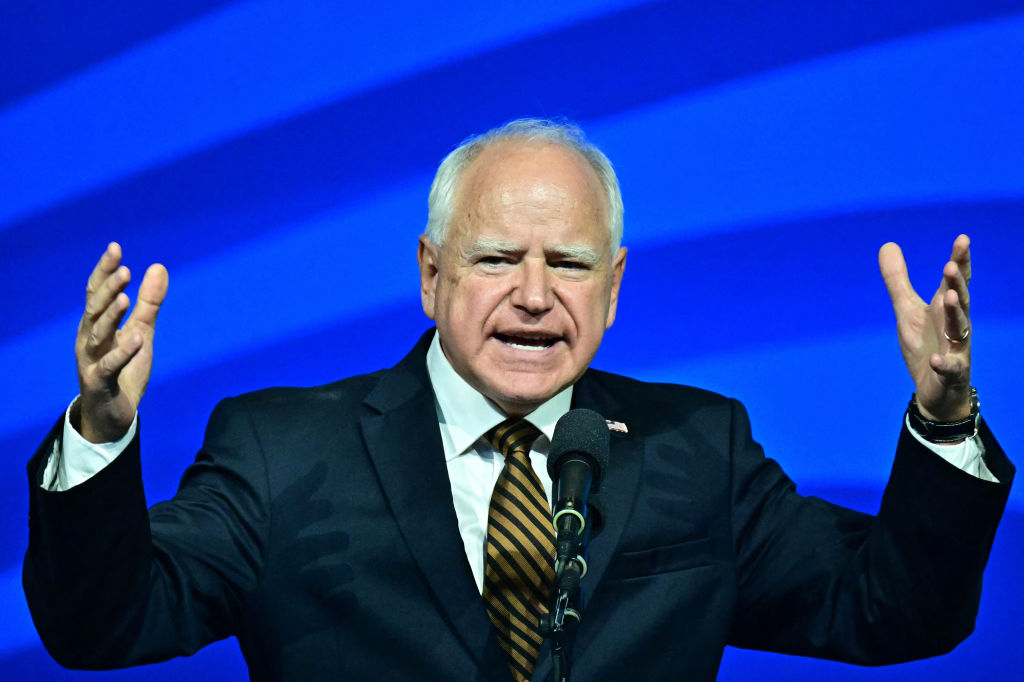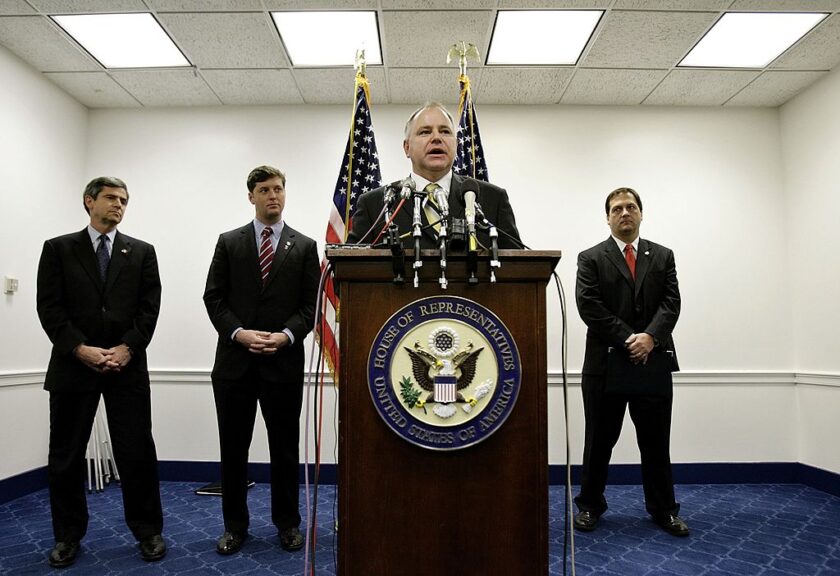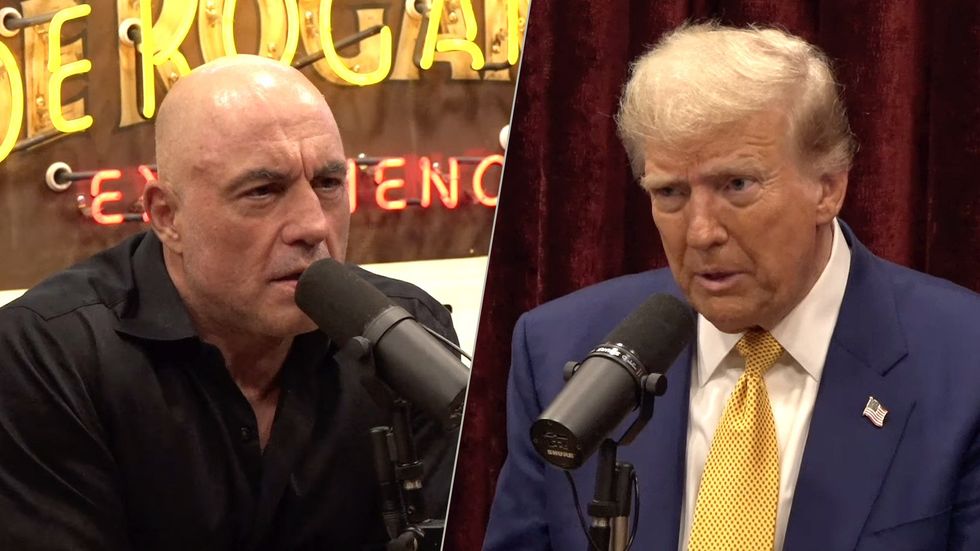Stolen Valor: The Truth About Tim Walz’s Military Record
The following is an edited transcript of a Saturday Extra edition of Morning Wire. Daily Wire editor-in-chief John Bickley sits down with retired Command Sergeant Major Thomas Behrends to discuss the controversy surrounding the military service of Minnesota Governor Tim Walz. The military record of Democratic vice presidential nominee Tim Walz has come under intense ...

The following is an edited transcript of a Saturday Extra edition of Morning Wire. Daily Wire editor-in-chief John Bickley sits down with retired Command Sergeant Major Thomas Behrends to discuss the controversy surrounding the military service of Minnesota Governor Tim Walz.
The military record of Democratic vice presidential nominee Tim Walz has come under intense scrutiny – amid accusations that he has engaged in “stolen valor.” Walz has claimed to have retired at a higher level than he did – and that he had carried “weapons of war in war,” despite resigning before his battalion was deployed. A man who has drawn attention to the issue for years, Thomas Behrends, became the Command Sergeant Major of the battalion after Walz left his unit after learning that his battalion was being deployed to Iraq.
* * *
JOHN: Joining us to discuss questions about Tim Walz’ record is retired Command Sergeant Major Thomas Behrends, who filled the void left by Walz after he announced his retirement from the force in 2005. Tom, thank you so much for joining us and thank you for your service.
TOM: You are welcome. Thank you.
JOHN: Let’s start with what prompted your involvement in this entire story, which has really taken over the national headlines. By 2016, you’d begun to call attention to the fact that Tim Walz was mischaracterizing his military service. What was he saying and what did you initially do about it?
TOM: Well, it originally started even way before that. I mean, when we actually got deployed, he got elected to Congress. He was a retired command sergeant major, this and that, you know. I’m in the first district where he was our congressman. And it was yearly we’d see his advertising out there. There’d be a flier and a mailer and I’d just throw it away. I brought it up to my Colonel. I said, “You know, I just can’t. What are we going to do with this guy?” I mean, he keeps lying about his rank. He says he’s the highest ranking member in Congress and he literally never got pinned. He got acting command sergeant major. He acted in that position for a few months, but he was never a bona fide one. He didn’t get it for retirement. He retired as a master sergeant. So for him to say he retired as command Sergeant Major was wrong. So this went on and on for literally almost 10 years. And then 2016 rolled around and he came and he was the speaker here in Lake Veterans Memorial. And he was saying I’m Command Sergeant Major and they had to write up in the paper about him with all his accolades. And I thought, is this ever gonna end? And then my neighbor, he sang the Star Spangled Banner and he tells me, “Well, I got to meet another command sergeant major, and I got to shake his hand.” And he was just like, “Boy, I got to meet two of you command sergeant majors now.” And I said, “Well, he’s not one.” I said, “He didn’t retire as one. He’s lying about his record. He didn’t finish the school. He didn’t do two years after the school.” And he said, “Well, we don’t know that as civilians.” So, somebody needs to bring this forward. I was in the battalion. I said the division or the state or somebody else should bring it up and nobody had. I did the right thing. I wrote a personal letter as a constituent to him in Congress. I said, “Thank you for your 24 years of service. Thank you for doing what you do for veterans. You know you didn’t achieve the rank of command sergeant major, please refrain from doing that from now on. Just set the record straight, tell everybody that, well, I made a mistake, whatever you got to do. Just come clean and don’t do this anymore. You’re starting to get under people’s skin.” I never heard a response. I sent it to all of the people who were on the committees that he was on, like the Armed Services Committee. I never heard a word back from anybody. And then two years later, he’s running for governor. And it was like August. I was like, for Pete’s sake, can you just go crawl under a rock so we don’t have to deal with this crap? You’re spewing all this out again and now I gotta get off my tractor and go make a banner to put on my bin and do whatever to try to tell the public out there that you’re a fraud. And it just got suppressed by the media back then. It got suppressed.

Chip Somodevilla/Getty Images
JOHN: So you initially reached out to him personally, got no response back, and then you started to feel when he ran for governor that maybe you had to take this up a notch in terms of public awareness. And the media, you say, just ignored your claims.
TOM: Well, they not only ignored it, I sent it to the Star Tribune reporter and he got ahold of me and he’s like, “These are very serious accusations.” And I said, “Well, here’s the people you need to contact to verify this. Vet it, vet the story. If it’s true, publish it. If it’s not, then sue me for slander.” Because I said, “He’s a sitting congressman. These are pretty serious allegations.” He got back to me and he said, “Well, I vetted your story. It’s true, we’re looking at publishing an article.” This was like late October of 2018. Then he got back to me and he said, “Well, my editor nixed it because they said it’s too close to the election.” And they didn’t want to influence the election. Maybe not exact words, but pretty close. And I thought to myself, what the hell is this, North Korea? I couldn’t believe it. I was like, this is a true story. This should influence the election. People should be able to read this and determine if this is who they want to vote for governor. And they just hid it.
JOHN: So it has been absolutely confirmed that he did not retire as a command sergeant major, but instead one level below that, correct?
TOM: He’s a Master Sergeant E-8.
JOHN: So that’s been confirmed. One of the questions that has been raised by the legacy media is whether or not he knew for sure that you were going to deploy to Iraq or not at the time that he decided to retire. Can you walk us through the timeline of that year, 2005?
TOM: Yes, I can. And it’s really ironic that this came out in the last few days, but he actually filed with the FEC for running for Congress on February 10, 2005, according to an article that was right out on CNN. Then on the 17th of March, the warning order came out. I knew it was in March sometime. And then on 20th of March, his campaign put out a statement. That basically said, “No, I do not know if it’s my artillery unit that’s going to go on this mobilization. I can’t comment any further on it.” But he said, “As command sergeant major, I have responsibility, not only to ready my battalion for Iraq, but to also serve if called on. I’m dedicated to serving my country to the best of my ability…” and on and on. And at the end he said that he has enthusiastic supporters and a very dedicated and intelligent wife, both a major part of my campaign, whether I am in Minnesota or Iraq. Two months later, he walks out of the armory and quits. His statement in March states that he knew. No doubt, absolutely zero — the legacy media — that’s been the question, when did he know? And you know, it’s coming out now that he probably even knew in late 2004, because the state knew in the summer of ‘04, and they were already starting to plan, and more than likely the battalions of the senior leadership found out some tidbit back in ‘04, but we don’t have a document. This document right here came two months before he quit. He knew damn well that we were going.
LISTEN: Catch the full interview with Tom Behrends on Morning Wire
JOHN: Now you’ve characterized this as him abandoning his men. What was the impact of him leaving? How did that impact these particular men – there’s a, there’s a lot of them, hundreds of them under his command.
TOM: Men and women, I mean, soldiers across the board. I think it’s like a deflating balloon when something like that happens. It’s like your dad died unexpectedly from a heart attack or from a car wreck or something. You’re, the wind is taken out of the sails. Everything is like, okay, we’re full steam ahead. We’re getting ready. We got our leadership in place. We’re going to get ready. We’re preparing for war and all of a sudden the sails are straight up and down with no wind in them. I mean, that’s it. You’re just done. Everybody was in shock. Who does that? Who leaves their kids hanging on something like this?
JOHN: And so you filled that role. You took over and led that battalion. Can you tell us about that? What was that experience like?
TOM: Well, it was an absolute honor to even serve my country in a greater capacity. if they would’ve asked any other CSM that I know in my career, they’d have snapped up on that right now. If you’re offered a position like that … I honestly said, “Well, I gotta talk to my family.” Because I had to volunteer to do it. I don’t know a hell of a lot of them who would have said yes in a heartbeat, and they went home and told their wife, “I got asked to go to war.” That’s what they would have done. And their wife would have probably told them, what I’ve heard some of them say, “There’s no way you’re not going on that deployment.” I don’t know his family, I can’t read their minds, I have no idea what happened with them. That’s really how it was. They needed to get somebody in there reasonably soon because they knew that as these warning orders came in March, that just means there’s going to be another order coming out which is going to finalize things more, which was the alert order in July. But they needed me to make a decision quick. It was like three weeks or a month later, I don’t know, early June when I was like, okay, I’m on board now. I went around to the unit and said, “Well, he’s gone. I’m here. Let’s get ready and let’s go.”
JOHN: And you served for about a two-year deployment in Iraq, correct?
TOM: Yeah, it was 22 months total. I mean, we trained for six months at Camp Shelby and then we went to Iraq and we got extended in the surge and we ended up over there for 17 months, whatever it was, damn near a year and a half.
JOHN: How do you believe Walz’s representation of his military service has influenced his political career? Has it helped his political career?
TOM: Immensely. His lying and saying he was a command sergeant major is a big thing. It’s a big thing for the military. I think the general public that watches movies, when they hear command sergeant major they think of a supreme leader person. Basically, it’s a very prestigious rank. It isn’t just handed to you, you’ve got to do the Sergeant Major, United States Army Sergeant Majors Academy where they educate you on everything under the sun and leadership is a big part of it. And then you have to serve two years after that because they put all this taxpayer money into you. It’s a big deal. Some of the innuendos he’s put out there about, “We were going here in support of Operation Enduring Freedom…,” maybe throws out in Afghanistan or throws Iraq in the sentence somewhere. The general public looks at it like, well, he was in support of being in Afghanistan or Iraq. It’s just weird how he spins those things, but it’s all for political gain. And that’s the sad part about where I came out with the stolen valor side of it. It’s like he’s doing all this for extra recognition and to get further ahead.

Chip Somodevilla/Getty Images
JOHN: So you’re saying, this is driven by ambition. Do you think that his decision not to go was cowardly?
TOM: I honestly do. It’s cowardly and political. When I listened to Jesse Ventura talk on CNN the other night. You know, and I’ve kind of had that suspicion before, too. Because back in our day, with the Iraq war starting, it kind of started to divide the nation a little bit. You had one side say Afghanistan was the real war and just war and Iraq was maybe not. It was Bush’s war. They had no Al Qaeda there, why are we there? There’s that kind of weird division in there. And that’s the question I’d like to debate him and say, “If the order would have said Afghanistan, would you have went?” And see what he would say. Well, maybe he would, I have no idea. But it seems to me like after Jesse said different things and then Bush made an executive order to activate the guard, it seems like it’s gotta be politically driven too. I don’t think he could fight in Bush’s war. It’s kind of my feeling, but on the other hand, it was cowardly to just be like I’m not going to go. I mean, you can’t pick and choose where your nation wants you to go. If that would have been the case in World War II, how many of our ancestors would have went to Germany? Germany didn’t attack us. Japan did. So, okay, if I got deployed to go to Germany, do I not go because it’s not a just war? They didn’t attack. You can’t make that choice. When it comes down, you go. Then you go home and you tend your garden and run for Congress and do whatever the hell you want.
JOHN: So you’ve reached out to him personally in the past trying to get a response. What would you like him to answer right now?
TOM: I think I would like him to come to Brewster, to our Veterans Memorial, and sit down on one of the benches in front of Kyle Miller, who was 19-years-old and went on a mission that — he had a dream that he was going to die — and he would not allow somebody else to take that position. He told the chaplain at that point, “If somebody else gets injured or dies and they took my place, I wouldn’t be able to live up myself.” I’d like him to sit right there and tell that kid, this is why I did not go on that mission that I should have went on. And just say it right there and maybe even have Kyle’s mom stand in there so she can hear it too. That’s the sad part about it, that a 19-year-old kid made the right decision. He got in that seat, he went up to get equipment to make the world safer, to make his unit safer, to put radar jamming stuff on vehicles. He went and got training. He hauled gear back and he rolled over a roadside bomb and he got killed. And that’s what Tim Walz did not do.
JOHN: Wow. What are you hoping comes of this? What do you hope that the American people take away from this – politically, but also in terms of the importance of service?
TOM: Well, that’s what I think needs to get brought out of this whole thing. This is just not right. To embellish your career, to try to make yourself look better than you are militarily. If you do this, you’re going to get hammered. And I think that’s what needs to come out — that you don’t put the uniform on and put a combat infantry badge on it and a Silver Star and a bunch of combat ribbons to go walk around and act like you are actually somebody that was there. I mean, we got freedom of speech here, but I think there ought to be a line where that’s not even allowed, where you get tarred and feathered down here at that point and paraded down the street, that you’re a traitor. That’s the sad part about what went on here. You know, and then to embellish your career at that level. He should have never really even been a voted governor. I think if the public would have known what this makes veterans and soldiers feel like and if that would have been brought out at the state level, I don’t think we’d be having this conversation today. But it got suppressed and it got hidden. And then now, here we are in the national stage and it’s a big firestorm now because a lot of people realize it’s wrong. The mainstream or whatever media that’s out there, they’re trying to cover and they’re trying to make different innuendos and excuses and saying that he misspoke and whatever. If you tell me you misspoke, I’m just like, well, okay, did you even know what the hell you were saying? Or was it a lie? If you’re supposedly running for vice president, you have to have the person running for president cover you and say that you misspoke and be your spokesperson behind you. Is that who we really want to be in power? That’s the sad thing on that whole level too. What the hell was she thinking picking this guy? Does she have a vetting team? What is her team even thinking? You got three people you’re looking at, one of them in a glowing clown suit, and he’s the one you pick? Honestly, it’s incompetence.
JOHN: You’ve mentioned him serving as a governor. What do you think about his record as a governor?
TOM: Well, it follows in what he’s always done. He may not be the highest ranking member of the chameleon party, but he is very far up there. He’ll land on your arm and he’ll be the color of your shirt and then land on mine and it’ll be this and he’ll go do whatever. He did that in the first district here, he was a member of the NRA and I’m wearing my black and red flannel and I’m doing this and that, but then when he got to be governor level, and he got the trifecta, and his true colors came out. And I told people, this guy’s way more liberal than you think. His voting record was to close Gitmo, to get out of the Iraq war, all Left policies. And when he got here, into the state, he basically became a complete Left-wing dictator. He did not listen to — they talk like he reaches across the aisle. Well, he reaches across the aisle and tries to pull you over to his side. He doesn’t shake your hand and say, “Let’s work on this together.” It’s my way or the highway. And that’s the sad part about what he did here. He literally let the cities burn and the documentary of The Fall of Minneapolis, those things came out because the people in the cities, they were in a war zone up there and he wouldn’t call the guard out because, I honestly think he did want it to just burn down and just let it go. I mean, it’s just pathetic. Three days it took to call the guard out. Just absolutely — you know, mentioning him in “leadership” together, you shouldn’t even do it. It’s a lack of leadership. It was just a horror. The state’s in disarray right now. We’re not united at all. We’re more divided than we ever were.
JOHN: Final question. Is there anything that you feel is not being emphasized enough by the media about this story, or do you feel like it’s just not gotten enough attention in general?
TOM: I think it’s one of these things that’s building. It’s like a prairie fire. It starts out as just a spark and it’s been getting bigger and bigger and bigger. And as the wind blows behind it, and you guys out there in the media keep investigating all this stuff that’s in his past — this is the tip of the iceberg of the whole situation. Let’s dig into his 31 trips to China. What is the relationship there? I don’t know, he’s got some skeletons in the closet that go deeper than this. I think this is exposing the first layer of his chameleon skin. And as we dig deeper, we’re gonna find out way more things. His character to me means there is more dirt. Because if you’re a liar, you’re probably a liar at even more levels. And for him to be this way with his military service, I think he’s going to have some other things come out that are going to shock the American public.
JOHN: Well, again, thank you for making the hard decision and putting your life on the line for all of us. And thank you for sitting down with us.
TOM: Thank you.
JOHN: That was retired Command Sergeant Major Thomas Behrends – and this has been a Saturday Extra edition of Morning Wire.
Originally Published at Daily Wire, World Net Daily, or The Blaze
What's Your Reaction?
































































































